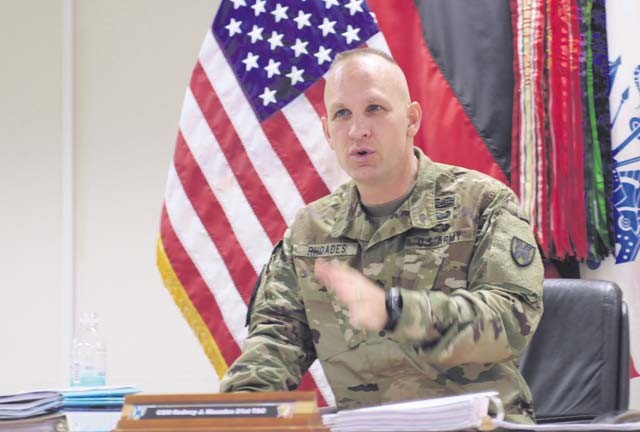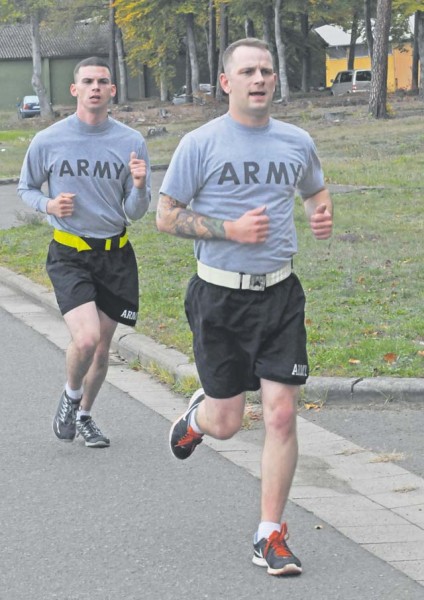
A sane junior NCO rises before four in the morning, triple-checks the decorations adorning his Army Service Uniform and refreshes his knowledge of obscure Army programs only for pretty compelling reasons. An opportunity to join the prestigious Sergeant Morales Club provided seven enlisted leaders from the 21st Theater Sustainment Command and 10th Army Air and Missile Defense Command all the incentive they needed.
The NCOs competed for entry into the club the morning of Oct. 22 at Kleber Kaserne and Rhine Ordnance Barracks, two regional TSC hubs. The culminating board and Army Physical Fitness Test marked the end of an equally arduous and rewarding journey for some, and a challenging “gut check” for others.
Candidates serving with organizations across the two-star command, including the 16th Sustainment Brigade, 18th Military Police Brigade and the 30th Medical Brigade as well as the 10th AAMDC reported to a board composed of distinguished senior enlisted leaders spanning the breadth of the TSC and chaired by its command sergeant major.
SMC boards differ significantly from conventional competitive and promotion boards. Candidates typically analyze and assess situations, integrate doctrinal and programmatic knowledge, and draw on personal experience rather than respond to direct informational questions.
“It’s a lot more situational,” said Sgt. 1st Class Nelson Rivas, treasurer for the Rheinland-Pfalz chapter of the SMC and a key organizer of the October board. “Knowing the ‘book’ answer is good; but sometimes as a leader you need to adjust to a situation. You have to go beyond ‘yes’ or ‘no’ answers. There’s not a regulation that tells you per se exactly how to handle a situation.”
Candidates understand the dynamic as do the SMC members who administer the program.
“The questions are based on leading styles and abilities rather than doctrine,” said Staff Sgt. Christopher Lynch, a Morales Club candidate who serves with the 18th Combat Sustainment Support Battalion, 16th SB. “You have to dig into the situation a lot deeper. There’s not a study guide that will give you the answers. You have to know the doctrine and you have to know how to apply it effectively; how to use it to take care of your Soldiers.”
Due to their depth, complexity and comprehensive scope, SMC boards also take much longer than others. Candidates might disappear into a board room and emerge an hour or more later, exhausted from tension, anxiety and the protracted physical rigidity of sitting “at attention” for 50 or 70 minutes. Lengthy and challenging oral examinations test candidates’ poise, ingenuity and mental agility. They also allow leaders to achieve much greater depth of understanding as they evaluate aspiring club members.
“Each candidate is in there for an extended amount of time, so they really get an idea of your leadership traits,” Lynch said.
While “boarding” candidates struggle to resolve leadership dilemmas posed by CSMs and senior SMC officials, their battle buddies endure long, tense waits for their turn.
“It feels like an eternity,” said Staff Sgt. Ivan Rodriguez, cargo specialist and SMC candidate serving with the 18th CSSB. “You’re waiting for hours, and it feels like days.”
Fortunately for anxious candidates, aspiring SMC members learn their fate immediately following the board. Presiding senior leaders and board members personally congratulate candidates recommended for induction and offer encouragement and guidance for NCOs who don’t make the cut. All candidates receive constructive criticism, professional development advice and praise in measures commensurate with their performance and accomplishments throughout the board. The Oct. 22 board selected four candidates for induction.
Membership is a process rather than an event.
“It starts with the first sergeant’s recommendation,” Rivas said. “Then the initial phase takes place at battalion level, the intermediate phase at brigade and the final selection at TSC level.”
The U.S. Army Europe command sergeant major confers final approval on nominees who meet all requirements and complete the boarding process across echelons.
The process begins modestly enough in most cases. An NCO might attend organizational meetings, participate in leader development sessions, support community and charity events or seek mentorship from SMC members. Formal nomination by the candidate’s first sergeant triggers a subsequent period of intensive preparation punctuated by board appearances at echelon, some including demonstrations of weapons knowledge in addition to the APFT.
“It can take months, it can take a year,” Rivas said. “What helps you get through it is the shared experience. I used it as a motivational tool for my own Soldiers. I hadn’t been to a board in 13 years, so it helped motivate them to see me preparing just like they were. It also motivated me to set the example.”
The club emphasizes community engagement as well as enlisted leadership.
“I want to be part of a group that’s giving back to the community and strengthening the NCO corps,” said Sgt. Phillip Smith, military policeman and SMC candidate serving with the 615th MP Company, 709th MP Battalion, part of the TSC’s 18th MP Brigade. “I like the professional development part too. You spend a lot of time with senior NCOs as part of NCO professional development and you learn a lot. You can pick their brain about things you want to learn about or things you’re unsure about.
“As NCOs, we always want to lead from the front and set the best example possible for our Soldiers,” Rodriguez continued. “As part of the SMC, you always have that base of knowledge, and you also have senior members to help you. That mentorship helps teach you to think outside the box and develop you as a leader. It makes you a better leader, and your Soldiers and your unit will benefit from that.”
Regional senior leaders view the club not only as a means of encouraging high professional standards and community engagement, but an engine of creativity and innovation.
“The SMC is the ultimate leadership laboratory for our NCOs in Europe,” said Command Sgt. Maj. Rodney Rhoades, TSC’s senior enlisted leader and president of the Oct. 22 Morales Club board. “It’s an ideal forum for coaching, mentorship and leader development. The candidates, members and senior advisers all learn something at every event.
“During the boards they demonstrate knowledge, analytical skills and apply doctrine as well as relevant experience,” he continued. “It takes courage, focus and discipline as well as a solid grounding in standards, discipline and doctrine to succeed in this setting — it’s not easy to face your senior enlisted leaders, especially when there are no ‘book answers’ to their questions. This really sets the candidates and members apart from their peers. It also builds better enlisted leaders for our command and our Army.”



